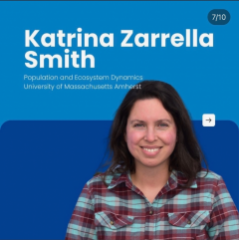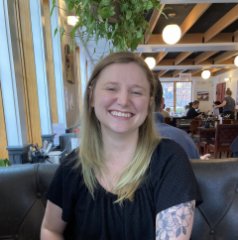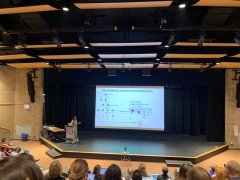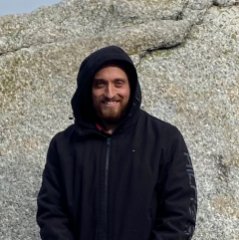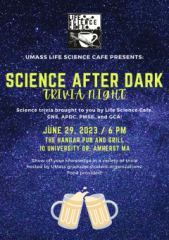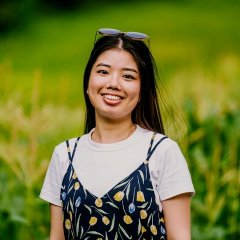News Highlights
Congrats to OEB faculty and students for an exciting paper on fish body size change!
Congrats to OEB faculty and students for an exciting paper on fish body size change!
Lead author Josh Lonthair - along with OEB students Estefany Argueta and John Swenson, as well as OEB faculty Lisa Komoroske - and co-authors - all worked to publish an exciting paper in the Journal of Experimental Biology showing how fish change is related to ecoloy. Congrats to all!
NSB's Agnes Lacreuse, Stephanie Padilla, and Jenny Rauch awarded a grant from the Alzheimer's Association
NSB's Agnes Lacreuse, Stephanie Padilla, and Jenny Rauch awarded a grant from the Alzheimer's Association
OEB PhD candidate Katrina Zarrella Smith awarded a NMFS-Sea Grant Fellowship
OEB PhD candidate Katrina Zarrella Smith awarded a NMFS-Sea Grant Fellowship
Katrina was selected to be the recipient of a 2023 National Marine Fisheries Service-Sea Grant Joint Fellowship. Her project is titled "Building a next-generation, climate-ready stock assessment informed by spatially explicit population processes". Since 1999, when the fellowship began, just over 120 individuals have been awarded this competitive fellowship. Amazing news, Katrina! More here.
PB PhD student Leannah Hicks selected as NCGA Research Ambassador
PB PhD student Leannah Hicks selected as NCGA Research Ambassador
Leannah Hicks will be part of the 2023–24 Ambassador Program of the National Corn Growers Association, designed for graduate students involved in research relevant to corn production and that demonstrate academic excellence and leadership potential. She will receive a financial award as well as funding to attend scientific conferences. Congratulations, Leannah!
MCB PhD candidate Saman Nayyab selected to give a talk at the GRC Fertilization and Activation of Development
MCB PhD candidate Saman Nayyab selected to give a talk at the GRC Fertilization and Activation of Development
Saman was selected to give a 10-minute talk at the Gordon Research Conference: Fertilization and Activation of Development in Holderness, NH, after presenting her poster "Characterization of TSSK1, TSSK2, and TSSK3 as potential targets for male contraception". This was her very first talk at a conference — way to go, Saman!
OEB PhD candidate Alex Winsor wins first prize in student paper competition
OEB PhD candidate Alex Winsor wins first prize in student paper competition
Alex Winsor won first prize in the student paper competition at the annual meeting of the American Arachnological Society at the Cornell University. His paper was called "Visual object categorization in the jumping spider brain". Congrats, Alex!
Calling all CNS Grad Students!
Calling all CNS Grad Students!
Happy end of the semester and start of summer! To celebrate, join your fellow grad students for an evening of food, fun, and trivia presented by CNS and Life Science Café and sponsored by your Graduate Student Organizations! Show off your science, UMass, and Sci-Fi knowledge on the 29th of June at 6pm at the Hangar Bar and Grill (10 University Dr., Amherst, MA)
We’ll buy the food and you buy the drinks! We hope to see you there!
Pre-register your trivia team and win an extra trivia point! Make a team ahead of time or join one day-of! Maximum of 8 people per group please. If there are more, feel free to break into two groups!
There will be questions across 5 different topics so get ready to be challenged!
Any questions? Please email: sglasser@umass.edu
Distinguished Professor Elizabeth Vierling elected to the Plant, Soil, and Microbial Sciences section of the National Academy of Sciences
Distinguished Professor Elizabeth Vierling elected to the Plant, Soil, and Microbial Sciences section of the National Academy of Sciences
Elizabeth Vierling is Professor at the University of Massachusettes Amherst and Founding Member of the ASPB Legacy Society. She majored in Botany as an undergraduate at the University of Michigan, and got hooked on lab research during a junior year abroad Freiburg, Germany. After a brief year as a technician at Northwestern University, she got a PhD in Biology at the University of Chicago studying the biogenesis of photosystem I. Her postdoc with Joe L. Key at the University of Georgia started her on research on heat shock proteins (HSPs), first focusing on chloroplasts. This work continued in her faculty position in the Biochemistry Department at the University of Arizona in Tucson, Arizona, where work expanded from chloroplast sHSPs to homologues in the cytosol and Hsp101, and then into isolating Arabidopsis thaliana mutants defective in heat tolerance. Projects now encompass not only HSPs, but also how nitric oxide homeostasis impacts growth and fertility and the control of mitochondrial gene expression and respiration. She’s now at the Biochemistry & Molecular Biology Department at the University of Massachusetts in Amherst, MA, and writes that “My research includes collaborations across the world that have been wonderfully enriching and expanded my research program in interesting and productive ways.”
Le Liu selected to be a CNS Leadership Fellow
Le Liu selected to be a CNS Leadership Fellow
Le Liu, a Ph.D. student in the Plant Biology program, was selected to be a CNS Leadership Fellow. Le will work with Associate Dean Karen Helfer on initiatives related to career preparation as well as on programming addressing diversity, equity and inclusion.
IDGP Diversity, Equity and Inclusion Statement
IDGP Diversity, Equity and Inclusion Statement
The Interdepartmental Graduate Programs in Life Sciences (IDGPs) believe that a diverse, equitable and inclusive environment is critical to all that we do. We recognize that systemic racism exists in our society and we pledge to educate ourselves so that we can change our ingrained habits and beliefs. We are committed to make our programs accessible to all and to increase the success of all our members. We dedicate our time, effort and financial resources to these activities. We work with Institutional leaders, faculty, staff and students to achieve these goals. We are providing this pdf link so that you are able to view a working document of our activities.
We are proud of our amazing students and post docs who have worked tirelessly for the betterment of our community. Our students have fostered a tight-knit, progressive community and their recent efforts have resulted in this petition for systematic change. We stand with them in recognizing that change is required in order to make progress toward a more equitable, just, diverse and inclusive environment.
The University has established an Office of Diversity, Equity and Inclusion and their website provides links to many resources. We encourage you to make use of these tools, including links to videos, books and podcasts as well as programing, as we embark together on our journey to improve our community for all our members.

